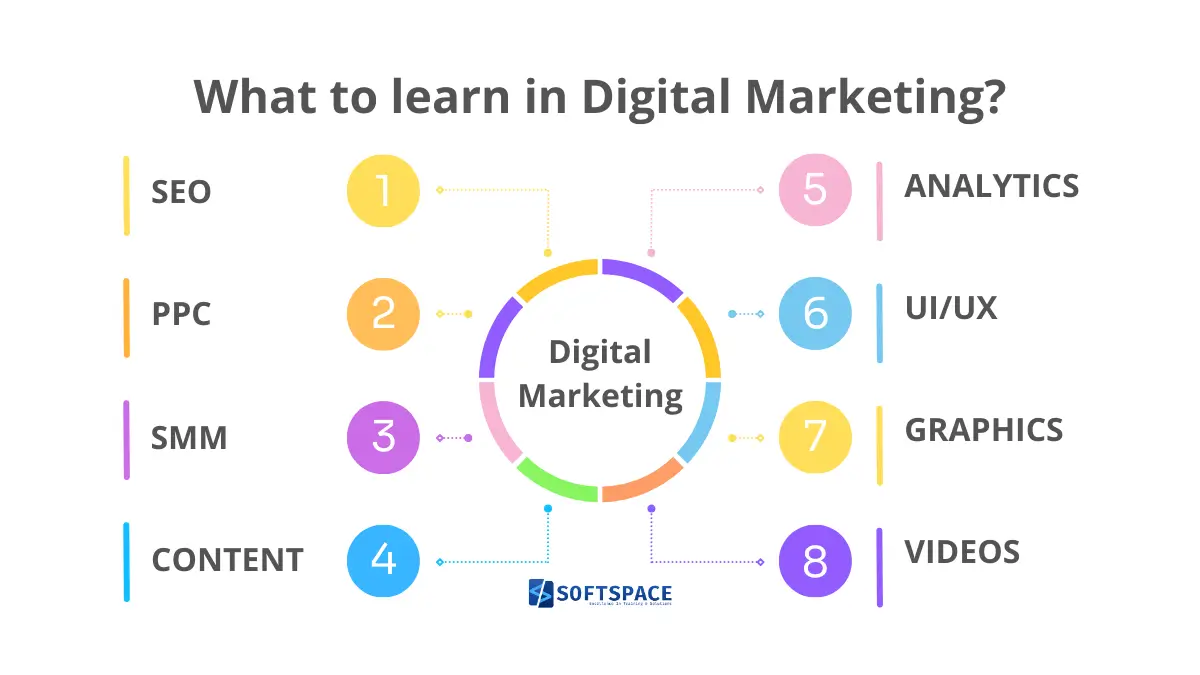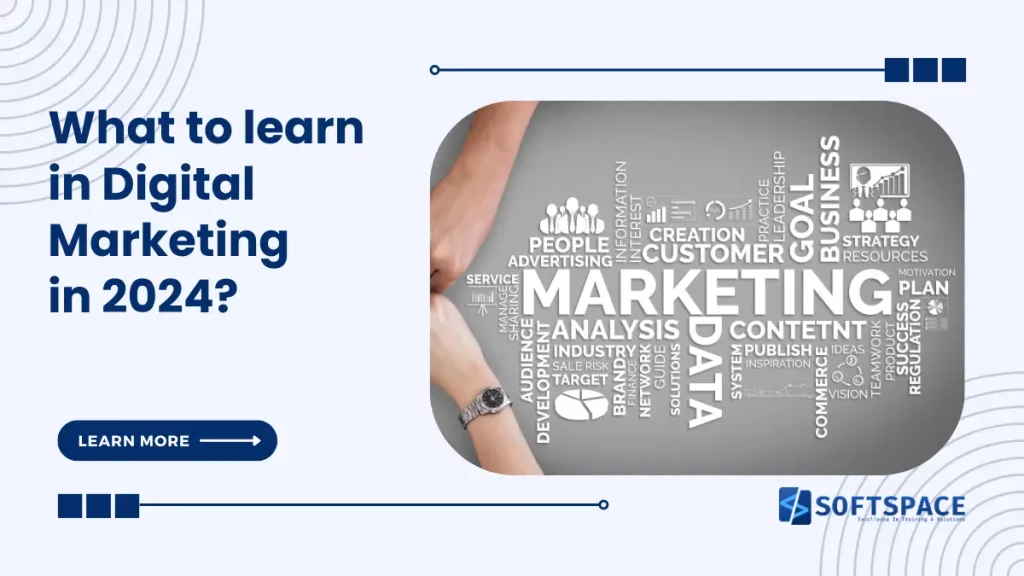The digital age has transformed how businesses reach and connect with their audiences. Today, a strong online presence is essential for any company hoping to thrive. This is where digital marketing comes in.
Digital marketing encompasses all the marketing efforts that leverage electronic devices or the internet. It’s a vast field with exciting opportunities for those who want to be at the forefront of brand communication.
Are you interested in learning digital marketing but unsure where to begin? This blog post is your roadmap to success! We’ll explore the core skills you need to develop, additional valuable areas to consider, and resources to kickstart your learning journey.
Table of Contents
Career opportunities in Digital Marketing
The digital marketing field offers a diverse and exciting range of career opportunities, with something to suit almost any skill set and interest. So, when you decide what to learn in digital marketing and which profile to choose, you can simplify your own future decisions. Here’s a glimpse into some of the most popular digital marketing career paths:
- Content Marketing Manager: Responsible for developing and overseeing a brand’s content strategy. This involves creating high-quality content (written, visual, and video) that attracts, engages, and converts leads.
- SEO Specialist: An SEO specialist optimizes websites and their content to rank higher in search engine results pages (SERPs). They stay up-to-date on the latest SEO algorithms and ensure a website’s technical SEO is functioning smoothly.
- Social Media Manager: Manages a brand’s social media presence across various platforms. This includes creating engaging content, scheduling posts, interacting with followers, and running social media advertising campaigns.
- Email Marketing Specialist: Crafts and manages email marketing campaigns to nurture leads, promote products and services, and build customer loyalty. They understand email marketing best practices and utilize automation tools for efficiency.
- Search Engine Marketing (SEM) Specialist: Focuses on paid advertising campaigns on search engines like Google Ads. They create and manage keyword campaigns, optimize ad copy and landing pages, and analyze campaign performance.
- Digital Marketing Analyst: Analyzes data from various digital marketing channels to measure campaign effectiveness, identify trends, and provide insights for optimization. They are data wizards who translate numbers into actionable strategies.
- Copywriter: The wordsmith behind compelling marketing copy. They craft website content, blog posts, email copy, social media captions, and other marketing materials that resonate with the target audience.
- Graphic Designer: Creates visually appealing graphics, illustrations, and other visual content for marketing campaigns. They understand design principles and use design software to create engaging visuals that support the brand message.
- Content Marketing Strategist: Develops a big-picture content strategy that aligns with the overall marketing goals. They identify target audiences, define content themes, and create a plan for content creation and distribution.
What to learn in Digital Marketing in 2024?

There are multiple aspects of digital marketing. So, what to learn in Digital marketing is the question. You can go with any of the following concepts. Social Media, SEO, Content, Advertising, Analytics, Email Marketing.
Content Marketing
- Content Creation: This involves crafting compelling content (written, visual, and video) that resonates with your target audience. Think blog posts, infographics, engaging social media captions, and informative videos.
- Content Distribution: Knowing where to publish your content is key. Explore distribution channels like your company website, social media platforms, email marketing campaigns, and even guest blogging opportunities.
- Content Marketing Tools: There are numerous tools available to streamline content creation and distribution. Familiarize yourself with platforms like content management systems (CMS) for website management, social media scheduling tools, and email marketing automation software.
Search Engine Optimization (SEO)
- SEO Techniques: SEO helps your website rank higher in search engine results pages (SERPs). This involves both on-page optimization (optimizing website content and structure) and off-page optimization (building backlinks from other websites).
- Keyword Research: Understanding what keywords your target audience is searching for is crucial. Keyword research tools can help you identify relevant keywords and optimize your content for better search visibility.
- Website User Experience: Search engines prioritize websites that offer a positive user experience (UX). This includes factors like website speed, mobile-friendliness, and clear navigation.
Social Media Marketing
- Understanding Platforms: Different social media platforms cater to different audiences and have unique features. Learn the ins and outs of prominent platforms like Facebook, Instagram, Twitter, LinkedIn, and TikTok to tailor your approach for each.
- Engaging Content Creation: Social media thrives on engaging content. Experiment with different content formats like images, videos, live streams, and stories to grab attention and spark conversations.
- Social Media Advertising: Paid advertising on social media allows you to target your ideal audience with laser focus. Learn how to create effective social media ad campaigns and track their performance.
Paid Advertising (PPC)
- PPC Platforms: Mastering popular PPC platforms like Google Ads is a valuable skill. Here, you’ll learn how to create targeted ad campaigns that appear on search engine results pages (SERPs) and other websites.
- Campaign Management: Effective PPC campaigns require ongoing management. This involves optimizing bids, ad copy, and landing pages to maximize return on investment (ROI).
- Landing Page Optimization: Landing pages are where website visitors arrive after clicking on your ad. Optimizing your landing pages for conversions is crucial for PPC success.
Email Marketing
- Building an Email List: Growing a targeted email list is essential for successful email marketing. Offer valuable incentives like free ebooks or discounts in exchange for email signups.
- Compelling Email Campaigns: Craft email campaigns that resonate with your audience. Segment your email list for more personalized messages and A/B test different subject lines and content to see what works best.
- Email Marketing Automation: Automation tools can streamline your email marketing efforts. Utilize them for tasks like welcome emails, abandoned cart reminders, and special offer broadcasts.
Additional Valuable Skills
In the competitive world of digital marketing, having the core skills under your belt is a great start, but those who truly shine will possess additional valuable abilities. Here are some areas that can set you apart. This is additional to what to learn in digital marketing other than the core concepts:
1. Data Analytics & Measurement:
- Data-Driven Decisions: The days of guesswork in marketing are over. In today’s data-driven world, understanding key metrics and KPIs (Key Performance Indicators) is essential. This allows you to analyze campaign performance, identify areas for improvement, and make data-backed decisions for better results.
- Analytics Tools: Tools like Google Analytics are your best friends! Learn to leverage these platforms to track website traffic, user behaviour, campaign performance, and more. By interpreting data effectively, you can gain valuable insights to optimize your marketing strategies.
2. Design Thinking & Creativity:
- Standing Out from the Crowd: Digital marketing is a crowded space. Develop your creative thinking skills to craft visually appealing and impactful marketing materials that grab attention and leave a lasting impression.
- Beyond Just Function: Effective marketing materials go beyond just functionality. Understanding design principles like color theory, composition, and typography allows you to create visually compelling content that resonates with your audience on an emotional level.
3. Other Valuable Skills:
- Copywriting: The power of words cannot be underestimated in marketing. Strong copywriting skills allow you to craft clear, concise, and persuasive messaging that engages your audience and drives action.
- Customer Relationship Management (CRM): Understanding how to build and nurture relationships with customers is crucial for long-term success. Familiarity with CRM tools and best practices can be a valuable asset.
- Staying Updated: The digital marketing landscape is constantly evolving. Develop a habit of staying updated on the latest trends, technologies, and industry news to ensure your skills remain relevant.
Bonus Skill: Understanding the Customer Journey
- Mapping the Path: In today’s digital world, the customer journey is not always linear. Understanding the different touchpoints customers have with your brand (website visits, social media interaction, email engagement) allows you to create a seamless and positive experience across all channels.
By focusing on these additional valuable skills, you’ll demonstrate a well-rounded skillset that’s attractive to potential employers and allows you to make a significant contribution to any digital marketing team. Remember, the key is to continuously learn, adapt, and stay ahead of the curve in this ever-changing digital world.
What to learn in Digital Marketing & How?
The exciting world of digital marketing beckons! If you’re eager to dive in and learn the ropes, this guide will equip you with the resources and steps to kickstart your journey.
1. Free Resources: Embrace the Power of Free Learning
The internet is a treasure trove of free digital marketing resources. Here’s where to begin:
- Online Courses & Tutorials: Numerous websites and platforms offer free online courses and tutorials on various digital marketing topics. Explore platforms like Coursera, edX, or websites of reputable marketing organizations.
- Industry Blogs & Publications: Stay updated with the latest trends and insights by subscribing to blogs and publications from digital marketing experts and industry leaders. Sites like Moz, Search Engine Journal, and Social Media Today are great starting points.
- YouTube Tutorials: YouTube is a goldmine of free video tutorials on all things digital marketing. Search for specific topics like “SEO basics” or “email marketing best practices” to find informative content.
If you’re looking for a comprehensive list of digital marketing topics and subjects, then you should follow the digital marketing course syllabus to prepare a learning path.
The digital marketing syllabus from GrowthAcad covers topics such as
- Fundamentals of Digital Marketing
- Mobile Marketing
- Video Advertising
- Growth Hacking
- Affiliate Marketing
- Web Analytics
- Email Marketing
- AI tools in digital marketing
- Website Planning & Analysis
- App Store Optimization
- Search Engine Optimization (SEO)
- Content Marketing & Blogging
- Search Engine Marketing (SEM)
- Online Reputation Management
- Social Media Marketing
- Google Tag Manager
- Influencer Marketing
- Display Advertising
- Marketing & Sales Automation
- eCommerce Marketing, and so on.
2. Explore the Paid Course & Certification Landscape
While free resources provide a solid foundation, consider structured learning for a deeper dive:
- Paid Courses: Online platforms like Udemy, Skillshare, and LinkedIn Learning offer comprehensive paid courses on digital marketing. These courses often come with certifications upon completion, adding value to your resume.
- Free Digital Marketing Certifications: Earning industry-recognized certifications demonstrates your commitment to the field and validates your knowledge. Popular certifications include Google Ads certifications, Hubspot Certifications, Semrush Academy and certifications from social media platforms like Facebook and Instagram.
Looking for a personalized Digital Marketing Course? We are here for you. Join our Hybrid training program where we take you through all the basic and advanced techniques with hands-on practical tasks on multiple projects.
3. Build Your Portfolio: Gain Practical Experience
Don’t wait for the “perfect” opportunity to gain experience! Here are ways to build your digital marketing portfolio:
- Freelancing: Platforms like Upwork and Fiverr connect freelancers with businesses seeking digital marketing services. Start by offering your services at a competitive rate to build your client base and showcase your skills.
- Volunteer Work: Non-profit organizations often need help with digital marketing tasks. Volunteering allows you to gain practical experience while contributing to a good cause.
- Personal Projects: Create a blog and experiment with content marketing strategies. Manage social media accounts for a local business or a friend’s band. Your personal projects can be a great way to showcase your creativity and problem-solving skills.
4. Network & Build Connections:
The digital marketing world thrives on collaboration and connection. Here are ways to network and build relationships:
- Online Communities: Join online communities and forums related to digital marketing. Participate in discussions, ask questions, and connect with other aspiring and experienced professionals.
- Attend Industry Events: Look for digital marketing conferences, workshops, and meetups in your area. These events offer opportunities to learn from industry leaders, network with potential employers, and stay updated on the latest trends.
- Social Media Engagement: Follow industry influencers and brands on social media. Participate in conversations, share valuable content, and build your online presence within the digital marketing community.
Digital Marketing Salary By Roles
- Digital Marketing Executive/Coordinator: 1.5 LPA – 4 LPA
- Content Marketing Manager: 3 LPA – 7 LPA
- SEO Specialist: 2.5 LPA – 6 LPA
- Social Media Manager: 2 LPA – 5 LPA
- Email Marketing Specialist: 2.5 LPA – 6 LPA
- Digital Marketing Analyst: 3.5 LPA – 8 LPA
Conclusion
Launching a successful digital marketing career requires dedication and a focus on several key areas. Building a strong foundation in core skills like content marketing and SEO is essential. Additionally, developing valuable skills like data analysis and creative thinking will make you a more well-rounded marketer. Remember, the digital world is constantly changing, so staying updated on the latest trends is crucial for long-term success.
So, when troubled with the question, “What to learn in digital marketing?”, we have this guide for you to better understand the skills required and the career prospects.

13+ Yrs Experienced Career Counsellor & Skill Development Trainer | Educator | Digital & Content Strategist. Helping freshers and graduates make sound career choices through practical consultation. Guest faculty and Digital Marketing trainer working on building a skill development brand in Softspace Solutions. A passionate writer in core technical topics related to career growth.




